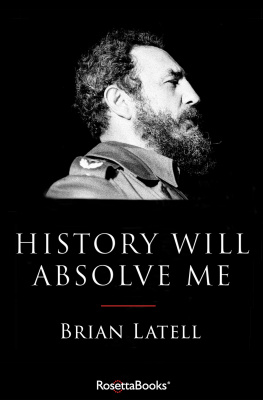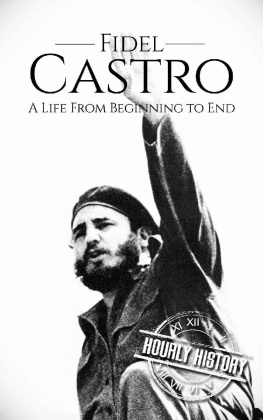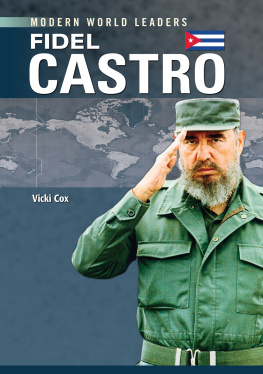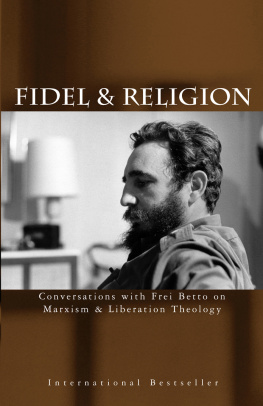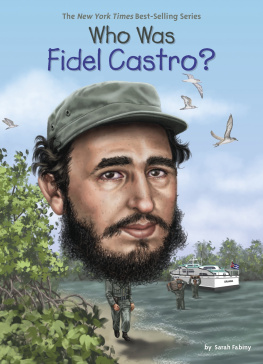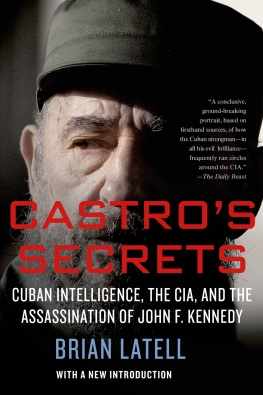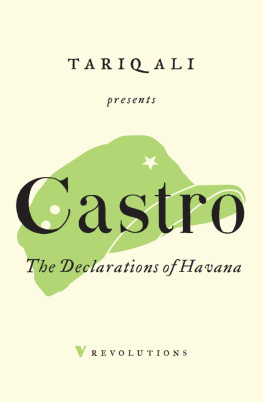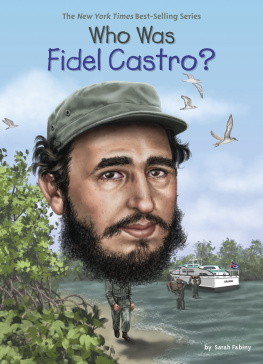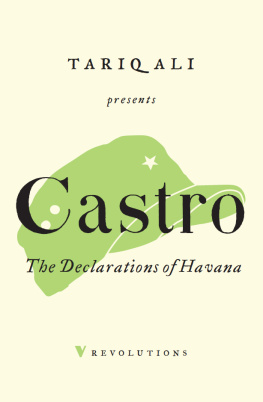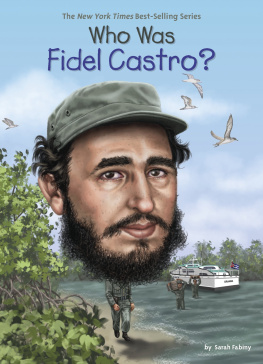History Will Absolve Me
Fidel Castro: Life and Legacy
Copyright 2016 by Brian Latell
All rights reserved. No part of this book may be used or reproduced in any form or by any electronic or mechanical means, including information storage and retrieval systems, without permission in writing from the publisher, except by a reviewer who may quote brief passages in a review.
Cover image of Fidel Castro speaking in Havana, 1978, derived from original by Marcelo Montecino. Licensed under a Creative Commons Attribution-ShareAlike 2.0 Generic license.
Published 2015 by RosettaBooks
Cover design by Jay McNair
ISBN EPUB edition: 9780795342769
Prologue
For more than fifty years, until his death, Fidel Castro and I parried and dodged in a strange and secretive pas de deux. We never spoke or met, but I suspect he would agree that we came to know each other as well as any two people could have across the decades-long standoff between our countries. My assignment as a CIA Cuba expert was to know him so well that I might imagine how his chin itched under the familiar beard, how he thought and made decisions, and therefore to anticipate what ugly surprises he might spring on the seven American presidents I served. Youve got to get into his boots, I was told by the wise CIA elders who first taught me. Try to think like Castro; take his pulse. For thirty-five years working as an intelligence officer, ultimately as National Intelligence Officer for Latin America, NIO, with civilian four-star rank, I tracked Fidel, always with that advice in mind.
I was in my early twenties in July 1964 when I joined the elite CIA team of analysts on the Cuba beat. Every scrap of information about him that our intelligence agencies could gather from spies and satellites, and from other exotic means, arrived on my desk. I began to read everything Fidel said in public, trying to discern clues to his plans. I dug up every shred of biographical information I could find, talked to defectors and exiles who knew him, and probed as best I could his labyrinthine psyche. It was not long before I was writing briefs for the Daily Summary, a top secret publication for the White House. Deceptively named, it was devoted exclusively to Cuba. Fidel was that important in Washington.
Fidel was in his late thirties when I began tracking him, the most flamboyantly original leader on the world stage. Invariably, he appeared in the unadorned olive-green uniform and shiny black boots of his guerrilla days, accented with a sidearm resting on his hip. The beard that he sported since going up into the mountains in 1956 was a trademark that he wore until the day he died. He smoked until the mid-1980s, often seen with a cigar clenched between his teeth or held outstretched to punctuate a gesture. Until the 1990s, he was never seen in public out of the character of this inimitable persona he had created of himself. In the guise of a perpetual revolutionary warrior, he was recognizable virtually everywhere on earth.
Perhaps more than anything else that defined him, he was a consummate performer and role player. I learned from a former Cuban intelligence officer that during Fidels exile in Mexico City in the mid-1950s he studied at an actors studio. He never acknowledged that, but it obviously served him well. His thousands of speeches and interviews during the many years he ruled were nearly always riveting performances. He rarely put on a bad show, even when his health began failing in the late 1990s and he stumbled or lost focus while on camera. His personality and presence were so imposing that he was always impossible to ignore.
He could rouse audiences of tens of thousands in Havanas Revolutionary Plaza, events that often ripened into huge fiestas, with food vendors and knots of partying Cubans in the crowd. Even when he rambled on for four and five hours or more, he remained the center of attention for everyone in his presence. In private settings, he was charming and engaging into his eighties. Foreign journalists vied for a chance to interview him. And if they did, they were putty in his hands. Even adversaries often finished a visit with him convinced at least of his sincerity and impressed with the scope of his learning. His sincerity more often than not was feigned. His encyclopedic knowledge was genuine.
He played many different roles. Considering how long he was in power, it was only natural that his leadership qualities and interests would evolve. He taught himself to become one of the best commanding officers of any modern military, large or small. Responding to his orders over the span of a quarter century, Cuban armies deployed to three African countries, fighting to victories in two of them and valiantly avoiding conflict in the third. Elsewhere, Cubas military steadied revolutionary regimes that Fidel favored. Paramilitary and guerrilla advisers following his dictates operated in a score of other nations. He learned diplomatic skills and exercised them in negotiations with many countries, notably to conclude favorable agreements with the United States. He was skilled as the leader of Cubas ruling communist party, securing massive subsidies from the Soviet Union, whose leaders he nevertheless often provoked. Unquestionably, he was most effective when conducting Cuban foreign affairs.
Among the diverse roles Fidel played, his favorite was the least known. Yet it was the one that absorbed him from his first day in power to the last. More than any of his other responsibilities, he delighted in performing as Cubas supreme spymaster. It was immediately an urgent priority for him to build a world-class intelligence capability, and within just a couple of years, he succeeded. Cuban intelligence for decades has ranked among the five or six best anywhere. In a few areas of clandestine tradecraftcounterintelligence, covert action or what the Cubans call active measures, and agent recruitmentthere may be no better practitioner. Cuban intelligence can be ranked so high because it is almost totally dedicated to just one target, the United States.
For Fidel, intelligence was a natural calling. He was a born conspirator. Even as a child, he deceived and manipulated others with exceptional ease. As a university student, he was charismatic and persuasive at convincing others to do his bidding. During two years as a guerrilla, he conducted successful clandestine operations, running spies and double agents while sniffing out penetrations in his own ranks. One of his closest associates at that time remembered that Fidel had a nose for risks and dangers. Once in power, he appointed others to manage Cubas main intelligence service, the General Directorate of Intelligence, or DGI, but those nominally in charge knew that he would run all the important cases himself.
I believe I was one of those cases. Working on Cuba during my first eight years at the CIA, I had not come to the DGIs attention. I was young, a journeyman analyst, and had no exposure beyond CIA headquarters. That changed in early 1973, when I took a temporary assignment in Buenos Aires, Argentina. I was there as a visiting analyst covering a presidential election, and was in touch with many Argentines, including intellectuals, government officials, and businesspeople. Cuban intelligence has always enjoyed an abundance of cooperative assets in Argentina. It was most likely from one of my contacts that the DGI first learned of me and my work as a CIA Cuba specialist. Years later, one of their officers confronted an Agency colleague visiting Havana and barked: Brian is the problem! Weve known about him since 1973.

